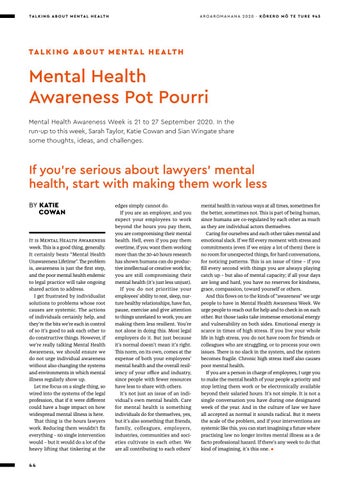TA L K I N G A B O U T M E N TA L H E A LT H
A roaromahana 2 0 2 0 · K Ō R E R O M Ō T E T U R E 9 4 3
TA L K I N G A B O U T M E N TA L H E A LT H
Mental Health Awareness Pot Pourri Mental Health Awareness Week is 21 to 27 September 2020. In the run-up to this week, Sarah Taylor, Katie Cowan and Sian Wingate share some thoughts, ideas, and challenges.
If you’re serious about lawyers’ mental health, start with making them work less BY KATIE COWAN
It is Mental Health Awareness week. This is a good thing, generally. It certainly beats “Mental Health Unawareness Lifetime”. The problem is, awareness is just the first step, and the poor mental health endemic to legal practice will take ongoing shared action to address. I get frustrated by individualist solutions to problems whose root causes are systemic. The actions of individuals certainly help, and they’re the bits we’re each in control of so it’s good to ask each other to do constructive things. However, if we’re really talking Mental Health Awareness, we should ensure we do not urge individual awareness without also changing the systems and environments in which mental illness regularly show up. Let me focus on a single thing, so wired into the systems of the legal profession, that if it were different could have a huge impact on how widespread mental illness is here. That thing is the hours lawyers work. Reducing them wouldn’t fix everything – no single intervention would – but it would do a lot of the heavy lifting that tinkering at the 44
edges simply cannot do. If you are an employer, and you expect your employees to work beyond the hours you pay them, you are compromising their mental health. Hell, even if you pay them overtime, if you want them working more than the 30-40 hours research has shown humans can do productive intellectual or creative work for, you are still compromising their mental health (it’s just less unjust). If you do not prioritise your employees’ ability to rest, sleep, nurture healthy relationships, have fun, pause, exercise and give attention to things unrelated to work, you are making them less resilient. You’re not alone in doing this. Most legal employers do it. But just because it’s normal doesn’t mean it’s right. This norm, on its own, comes at the expense of both your employees’ mental health and the overall resiliency of your office and industry, since people with fewer resources have less to share with others. It’s not just an issue of an individual’s own mental health. Care for mental health is something individuals do for themselves, yes, but it’s also something that friends, family, colleagues, employers, industries, communities and societies cultivate in each other. We are all contributing to each others’
mental health in various ways at all times, sometimes for the better, sometimes not. This is part of being human, since humans are co-regulated by each other as much as they are individual actors themselves. Caring for ourselves and each other takes mental and emotional slack. If we fill every moment with stress and commitments (even if we enjoy a lot of them) there is no room for unexpected things, for hard conversations, for noticing patterns. This is an issue of time – if you fill every second with things you are always playing catch up – but also of mental capacity; if all your days are long and hard, you have no reserves for kindness, grace, compassion, toward yourself or others. And this flows on to the kinds of “awareness” we urge people to have in Mental Health Awareness Week. We urge people to reach out for help and to check in on each other. But those tasks take immense emotional energy and vulnerability on both sides. Emotional energy is scarce in times of high stress. If you live your whole life in high stress, you do not have room for friends or colleagues who are struggling, or to process your own issues. There is no slack in the system, and the system becomes fragile. Chronic high stress itself also causes poor mental health. If you are a person in charge of employees, I urge you to make the mental health of your people a priority and stop letting them work or be electronically available beyond their salaried hours. It’s not simple. It is not a single conversation you have during one designated week of the year. And in the culture of law we have all accepted as normal it sounds radical. But it meets the scale of the problem, and if your interventions are systemic like this, you can start imagining a future where practising law no longer invites mental illness as a de facto professional hazard. If there’s any week to do that kind of imagining, it’s this one. ▪
